|
|
|
Atari 2600 Label Variations| The 2600, by far, has the market cornered when it comes to label variations.
Not only were a great deal of games released for the 2600, but due to the 2600's
long lifespan, many games were sold for several years and were produced with
several different labels. Most label collectors only seek out the major
label variations for any given cartridge, while some go after every minor
variation, of which there are quite a few. This list only contains major variations
by each company, along with pictures so you can get a feel for what the differences
are.
Atari
produced more label variations than any other company, which isn't terribly
surprising given that they produced more games for the 2600 than any other company.
Quite a few carts produced by Atari are available on at least two major label
variations, one being a Text
label and the other being a Picture
label. Other common label variations include the Blue
label carts produced by Activision
in their later years, the White
label INTV
versions of M
Network carts, and the Sears
Text/Picture
variations (similar to Atari). |
| 20th Century Fox | | Label Name | Description | Image | | Standard | This is the standard label for 20th Century fox. The top has the game's name in
a stylized font appropriate for the title, and beneath that is the 20th Century
Fox logo. Below that is some artwork depicting game action. About half of the
20th Century Fox games have the name of the game on the end label while the others
only have copyright text on the end, making them harder to identify without looking
at the main label. | 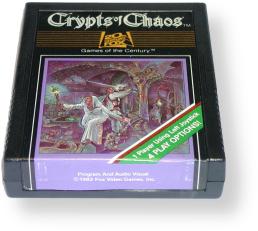 | | Red Sirius | Fox wanted to be in the videogame business in a hurry, so they licensed a number
of games from software company Sirius. These games have a red label with white
lettering, and an artist's rendering of what the game screen looks like in the
middle of the label. When Fox began producing their own games, they used their
own standard
label. | 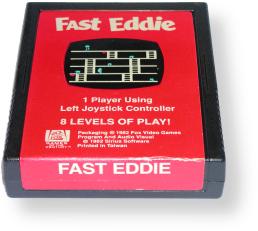 |
| Absolute Entertainment | | Label Name | Description | Image | | Standard | Absolute cartridges don't particularly adhere to one standard. They have stylized fonts appropriate for the title, and have the Absolute Entertainment logo on the label. Some feature pictures on the label some don't. The end label has the name of the game, again in a stylized font. Absolute games come in an Activision case, complete with the Activision name embossed on the back. Be careful with F-14 Tomcat for the 2600 - many of these are mislabeled 7800 versions. The only way you can visibly discern the difference between the two carts is by looking at the edge connector (where the cartridge plugs into the 2600). The 7800 connector is wider than the 2600. The Atari 7800 will play both versions of course. | 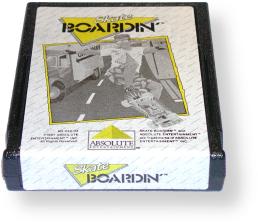 |
| Activision | | Label Name | Description | Image | | Standard | The standard Activision label has a solid background color with white lettering
and the Activision logo on top. In the middle is an artist's rendering of a game
screen with some brief instructions and game options sometimes shown below the
picture. The end label has the name of the game again in white. The label end
of the case is grooved with small lines, and the Activision name is embossed on
the back of the case. Many of these were later released in the Blue
label style. | 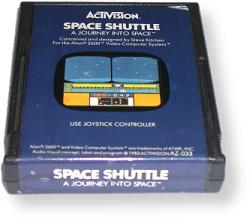 | | Special | Special labels are those that do not adhere to the standard
one-color-white-text style that most Activision cartridges use. These cartridges
usually have artwork that covers most of the label, and the title is in a stylized
font. The Activision logo is still somewhere on the front of the label. The end
label has the name in a stylized font as well. | 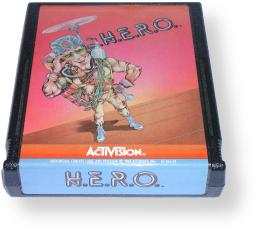 | | Blue | These labels came out of Activision's desire to cut costs late in the life of
the 2600. Instead of the normal labels with nice fonts and multicolored pictures,
Activision used a plain blue label with white text and no picture. A double-line
border surrounds the text. The end label has the game title in this same plain
font. Blue labels are slightly harder to find than their standard counterparts,
but they aren't particularly rare. | 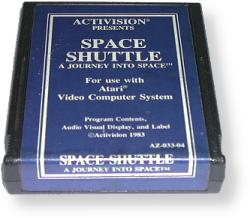 | | White | Most of Activision's white labels were released in Europe as PAL variations of North American NTSC releases. It's likely they were used for the same reasons as the Blue labels - to reduced production costs. In fact, they are exactly like the blue labels except they are white, usually with black text (some have blue text). | 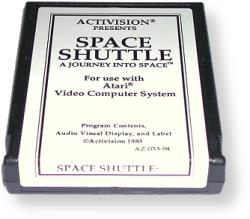 | | Black | | Picture Not Available |
| American Videogame | | Label Name | Description | Image | | Standard | Since American Videogame only produced one game, Tax
Avoiders, they only have a single label variation as well. It features a bright
red label that wraps around to cover the end of the cartridge as well. The bulk
of the label is occupied with a graphic, while the stylized Tax Avoiders name
is featured on the front of the label as well as on the end. Credits for the game
are actually listed in a small white font above the title. The game is contained
in a Sega grip-style
cartridge. | 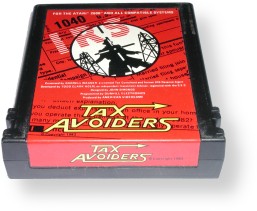 |
| Apollo | | Label Name | Description | Image | | Standard | This was the first style Apollo used for its games - colorful labels with interesting
artwork and white text. End labels match the color of the main label and repeat
the title. Later, Apollo moved to cut costs and began releasing their games with
simpler blue
labels. Some games were released in both styles. | 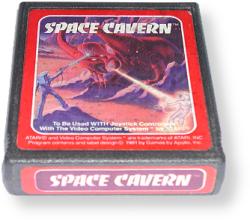 | | Blue | Apollo Blue labels all follow a similar format - a blue background with white text and a diagonally slashing picture. The logo is featured prominently on the main label, and the end label has the game title in white text between two gold bars. Not all games were released with this label, and some were released in both styles. | 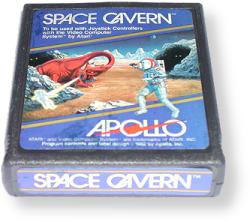 |
| Atari | | Label Name | Description | Image | | Text # | When Atari launched the 2600 in 1977, they offered nine games for sale. These
nine games had plain labels with colored text, and the end label had a number
on it next to the game name. The number referred to the internal development number
of the game - Combat
being the first (01). These numbered games were sold in gatefold boxes - the front
of the box opened outward like a book. Atari only sold their games in this style
for a year - after that, they changed to standard boxes (open from the top) and
text
labels without the accompanying numbers. This makes the Text # label an interesting
collectible, especially when paired with the box. | 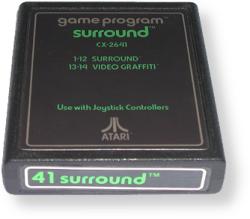 | | Text | Atari Text labels were the first major standard that Atari used. These labels
are very simple text featuring different colors for different games, on a black
background. There is a gray border around the main label and end label. Many Text
label games were also produced with a Picture
Label. | 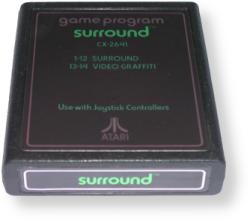 | | Picture | Perhaps the most common Atari label style, Picture labels were introduced in 1981,
replacing the older text labels and were used throughout the remainder of the
2600's lifespan. They feature the same font as the Text label, but feature a game-related
picture in the middle of the label. The end label simply states the game's name,
and there is no border around either the main or end label. Many picture label
titles also have text
counterparts, and there are a few other anomalies as well (Silver Asteroids,
Red Space
Invaders and Yars'
Revenge). | 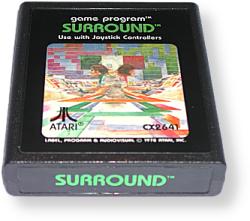 | | Silver | Atari Silver labels were used between 1982 and 1985, and were produced alongside
Picture
label games that continued to be sold. Most Silver label games did not appear
under other labels, with a few exceptions such as a Picture label Asteroids
and a Red label Gravitar.
The silver label variations of these two games are much harder to find. Silver
labels have a silver or gray background with a picture in the middle, and the
name in white letters across a red stripe. The end label is in red text on a black
background. | 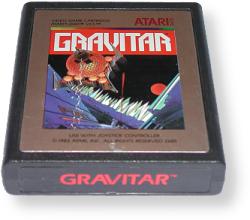 | | Children's | Children's label games are something of an odd assortment that don't really fit anywhere else. All of them have a grid pattern over a solid background with a picture in the lower middle of the label. The sub-category is shown on the upper left-hand corner of the cartridge - Children's Computer Workshop, Peanuts, Muppets, and Disney. The CCW games (Big Bird's Egg Catch, Cookie Monster Munch, and Alpha Beam with Ernie) have a yellow background with red text. Peanuts games (Snoopy and the Red Baron and the planned Good Luck, Charlie Brown) used the grid over a red background. The Muppets series (Pigs in Space and the planned Miss Piggy's Wedding) used the grid over a purple background. The Disney series (Sorcerer's Apprentice and the planned Donald Duck's Speedboat, Dumbo's Flying Circus, and Snow White) used the grid over a blue background. There was also a Garfield game that surfaced as a prototype that probably would have used the Children's style label as well. | 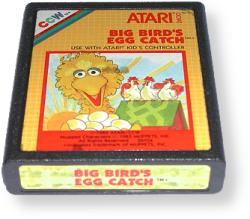 | | Red | Atari Red labels were produced from 1986-1990 when Atari was attempting to revive
the system. These labels range in color between dark-red and red-brown. For the
first year, the pictures were monochrome, then Atari switched to color pictures
on the red background. The text is white, and the end label is red with white
text as well. Some Red label games are re-issues of previous titles such as Gravitar
and Space
Invaders. Others were only released as a Red label. Atari also released all
of their third-party licensed games with this label (Donkey
Kong, Q*bert,
etc.). | 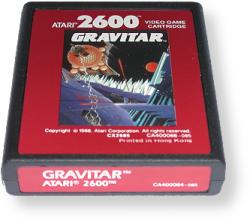 |
| Avalon Hill | | Label Name | Description | Image | | Standard | Avalon Hill cartridges have an unusual grooved casing with a wraparound label. There is a solid covered background with a picture and white text. The Avalon Hill logo appears at the bottom of the picture. | 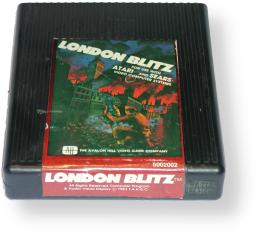 |
| Bomb | | Label Name | Description | Image | | Standard | Bomb cartridges are all fairly similar, with really only the title changed on
the label from game to game. The label is blue, with Bomb in red lettering and
the game name in yellow. The casing has the Bomb name embossed on the back,
and there are small grips on the side. | 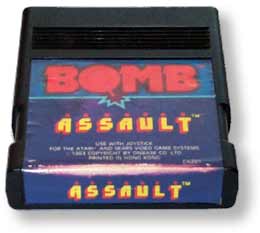 |
| Coleco | | Label Name | Description | Image | | Standard | Coleco games have a gray or white casing with grooves on the side near the end
label, and a beveled underside with the Coleco logo embossed in the plastic. Labels
have a black background with the game logo in color, and some informational text
in white and yellow below that. The end label is black and with Coleco in white
text along with the game's logo. | 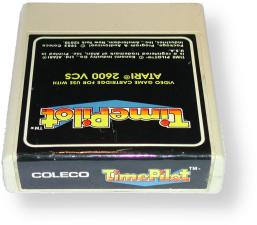 |
| CommaVid | | Label Name | Description | Image | | Standard | Most (all?) CommaVid cartridge cases are about an inch longer than a standard
2600 cartridge case. They don't all follow a set standard, but generally they
have a wraparound label with a color picture and a solid color background. The
CommaVid logo is on the main label. One exception is Magicard,
which has a plain white label with generic CommaVid text on it. The name Magicard
looks like it was simply typed on the label. | 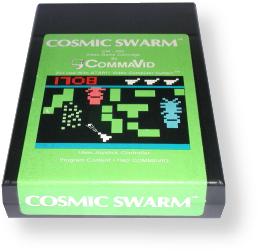 |
| Data Age | | Label Name | Description | Image | | Standard | Data Age cartridges come in a black casing with an angled end for the game name. The label is silver with a picture in the middle and a stylized game logo. | 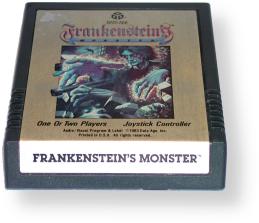 |
| Ebivision | | Label Name | Description | Image | | Standard | Ebivision labels are glossy with game artwork and title on the main label, along
with the Ebivision logo on the bottom. The limited edition versions are numbered
in the lower left-hand corner. Alfred Challenge does not have the Ebivision
name on it because it was released before Ebivision was formed in an official
capacity. | 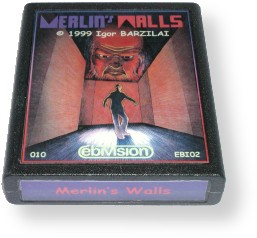 |
| Epyx | | Label Name | Description | Image | | Standard | Epyx games have simple labels on an Activision style case. Labels are white with blue text and do not feature a picture. | 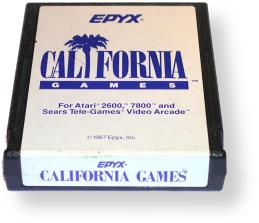 |
| First Star Software | | Label Name | Description | Image | | Standard | First Star only made one game for the 2600, Boing!
It has a silver label with some pixilated artwork and titling, as well as the names of the programmers and designers. The Xonox
version has a casing like a Xonox single
ender - the case is wider at the top and the end is beveled. | 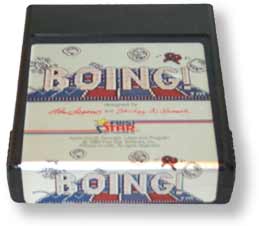 | | Xonox | First Star only made one game for the 2600, Boing!
It has a silver label with some pixilated artwork and titling, as well as the names of the programmers and designers. The Xonox
version has a casing like a Xonox single
ender - the case is wider at the top and the end is beveled. | Picture Not Available |
| Froggo | | Label Name | Description | Image | | Standard | Froggo labels are of better quality than their games. Labels are white with monochrome text and a picture appropriate to the game theme. | 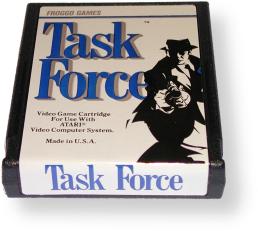 |
| HES | | Label Name | Description | Image | | Standard | HES mainly distributed other company's games, and the labels come in many different
forms. Usually, they are a single color background with the games name in simple
text. Their only original game, My
Golf, was apparently distributed by Salu and has a standard
Salu label. It's a white background with black text. The casing feels like a softer
plastic than most cases. | 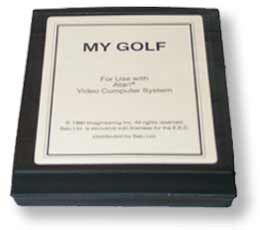 |
| Imagic | | Label Name | Description | Image | | Text | Imagic text labels have the same casing and style as Imagic picture label carts, but are a bit more plain in that they are lacking the picture shown on the box. The label is silver with a multicolored band upon which is written the game title and other information. The Imagic name is embossed on the end of the cartridge. Some Imagic games were produced with both types of labels, and both styles are sought after by label variation collectors. | 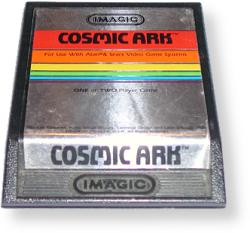 | | Picture | The Imagic picture label style is noticeably different from the text labels in that they contain a flashy picture in the lower middle of the label. The game title is written in black across a multicolored band, and the Imagic name is embossed on the end of the cartridge. Some Imagic picture label games were also released in the text style. Most people prefer to have the picture label if given a choice, but some collectors seek both versions. | 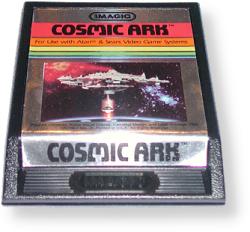 |
| Intellivision Productions | | Label Name | Description | Image | | Standard | These recently produced games come in a standard case with colorful labels.
The main label has game artwork and the game title, and the end label has the
title again. The Intellivision Productions name appears at the bottom of the
label. | 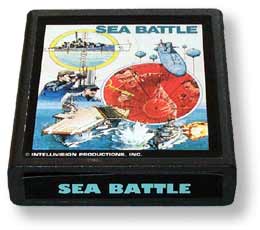 |
| INTV | | Label Name | Description | Image | | White | INTV purchased the rights to MNetwork
games from Mattel and released them with this white label. It consists only of
a small end label, with black text on a white background. It is identical to the
MNetwork version
except for the color. There is no main label for these games. The unusual shape
comes from the fact that the main portion of the case is an Intellivision cartridge
case with an Atari-sized adapter on the end. INTV games came with black and white
manuals in an attempt to cut costs. | 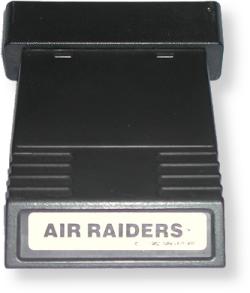 |
| K-Tel Vision | | Label Name | Description | Image | | Standard | K-Tel Vision cartridges come in an unusual T-shaped case, similar to Ultravision
and MenAVision. The labels have the K-Tel name along with the game name, and
four seemingly unrelated pictures. They are very odd. | 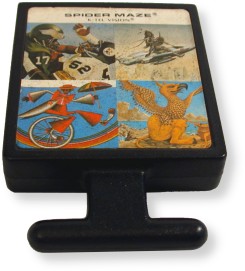 |
| Konami | | Label Name | Description | Image | | Standard | Konami only released three games for the 2600 and all have the same style label. Casings have a rounded end with a black label and some game-related artwork in the middle of the label. The end label is white with colored text. These were released in Europe under the name Gakken. | 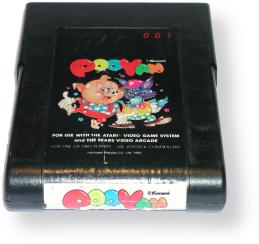 |
| M Network | | Label Name | Description | Image | | Black | MNetwork labels only cover the end of the cartridge, there is no main label. It
is a small black label with light blue lettering for the game title. The casing
is made from an Intellivision cartridge mold with a 2600-size adapter on the end.
This is almost identical to the INTV
label/case except for the colors. | 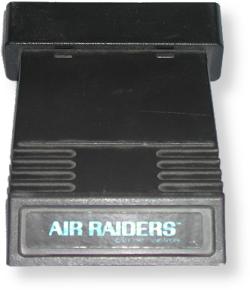 |
| Milton Bradley | | Label Name | Description | Image | | Standard | Milton Bradley only released two games, Spitfire Attack and Survival Run, and they both come with labels created in a similar style. However, it is common to find both of these games without an end label. Apparently Milton Bradley shipped these games with a set of stickers to be applied to the controller. On this sticker sheet was also an end label to be applied to the cartridge, but it would seem that many people never bothered. We therefore consider the cartridges with an end label to be a hair more valuable than those without. | 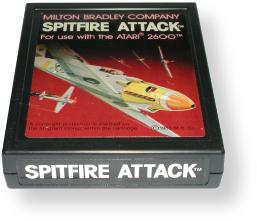 |
| Mystique | | Label Name | Description | Image | | Standard | Mystique games have a grid pattern against a solid background with some game
related artwork in the middle. The Mystique name and game title appear on the
main label, and the name is repeated again on the end. Mystique packaged their
games in oversized gatefold boxes, inside which was a fake leather case that
held the cartridge. There was even a lock and key to keep the youngsters from
playing mom and dad's game. | 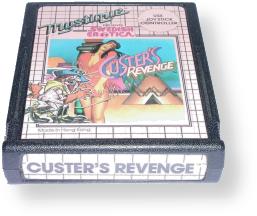 |
| Mythicon | | Label Name | Description | Image | | Standard | Mythicon labels are black with a picture in the middle surrounded by a white border. The title is in red text on both the main and end label. The cartridge is numbered in order of release in the upper left hand corner. Too bad their games aren't as good as their label artwork. | 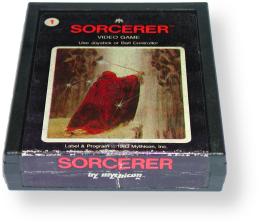 |
| Panda | | Label Name | Description | Image | | Wraparound Label | Panda released their cartridges in two formats - one with a single label that
covers the main area and wraps around the end, and one with just an end label.
Wraparound labels are either all white with black text and the Panda logo or white
around the end with a color picture main label. Panda boxes are blue with white
text and the black Panda logo, with some game art on the lower portion of the
box. Panda games are very hard to find with nice labels, as apparently they used
very cheap material. Boxes are also very difficult to find. If you have pictures
of any other Panda games that came with wraparound labels, please
contact us. | Picture Not Available | | End Label Only | Some Panda games only have an end label, with no main label at all. These are
either maroon or black with white text. Panda boxes are blue with white text and
the black Panda logo, with some game art on the lower portion of the box. Panda
games are very hard to find with nice labels, apparently they used very cheap
material. Boxes are also very difficult to find. If you have pictures of any of
the other Panda games with this label style, please
contact us. | 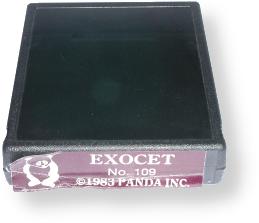 |
| Parker Brothers | | Label Name | Description | Image | | Standard | Almost all Parker Brothers cartridges fall into this category. They have an unusual
angular casing with horizontal grooves and a trapezoidal gray label. There is
a color picture of game artwork in the middle of the label, and the title and
copyright information appears on the end label. | 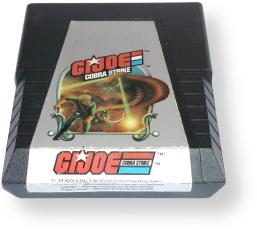 | | Gray | Only one cartridge falls in this category - G.I.
Joe. This game was released with both a color
picture label and a simple gray logo label. The color version seems a bit harder
to come by and most collectors seem to prefer this because it's, well, more colorful. | 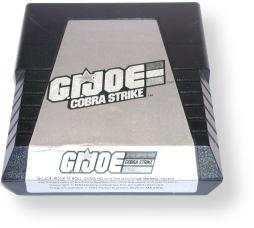 |
| Playaround | | Label Name | Description | Image | | Standard | Playaround cartridges are double-enders, but they are not as long as Xonox' cartridges.
There is game art for each game and arrows to tell which side is which. There
are plugs that cover each end of the cartridge for when it is not in use, and
these have the game title on them as well. The cartridges were also packaged in
small faux-leather cases inside the regular box that included a small lock and
key to keep junior away from the adult games. Playaround packaging was quite nice,
unfortunately (or maybe fortunately) their games were not. | 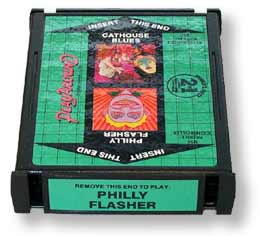 |
| Salu | | Label Name | Description | Image | | Standard | Salu was really a distributor of games by other companies, but they typically
used the same label style for all of them. They have a white background, with
black text, and "Distributed by Salu" at the bottom. They usually have
a copyright citing the developer's name as well, such as Activision in the case
of Ghostbusters
II. | 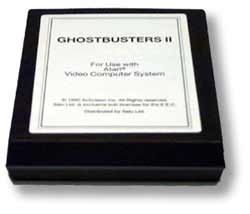 |
| Sears | | Label Name | Description | Image | | Text | Sears was an early supporter of Atari, and they sold Atari merchandise under their
own brand name. This included both hardware and software, and the Sears version
was called Sears Tele-Games. All but three Sears games are simply repackaged Atari
games (Steeplechase,
Stellar
Track, Submarine
Commander). Sears cartridges can be found in Text and Picture varieties, and
they are very similar to the Atari versions. Sears also released the first nine
Atari games in unique gatefold boxes, but they did not make numbered labels like
Atari did. Sears Text labels are black with TELE-GAMES in large font, followed
by a listing of games on the cartridge. Some people mistakenly call these 'multi-carts',
but they are just game variations and not any different from the Atari version.
Many Sears cartridges can be found in both Text and Picture variations. | 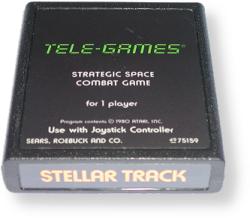 | | Picture | Sears was an early supporter of Atari, and they sold Atari merchandise under their
own brand name. This included both hardware and software, and the Sears version
was called Sears Tele-Games. All but three Sears games are simply repackaged Atari
games (Steeplechase,
Stellar
Track, Submarine
Commander). Sears cartridges can be found in Text and Picture varieties, and
they are very similar to the Atari versions. Sears Picture labels are typically
harder to find than their text counterparts, but not by much. They have a black
background with a picture in the middle and colored title text on the main and
end label. The Sears logo appears above the title on the main label. What makes
some of the Sears games interesting to collect, is that while some of them simply
reuse Atari artwork, others have all new artwork on the label, manual, and box.
Sears titles are often harder to find than their Atari counterparts because they
were only sold at Sears, which makes them challenging to acquire, especially boxed. | 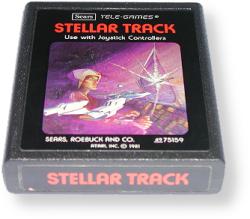 |
| Sega | | Label Name | Description | Image | | Grip Case | Sega Grip case games usually have a white label with colorful text and some game
artwork. The Grip case is different from the normal case because it has the Sega
name embossed on the back of the cart, and there are some large grooves on the
side near the end label that make it easier to grip the cartridge when inserting
or removing it. Some Sega games come in Normal
and Grip styles. | 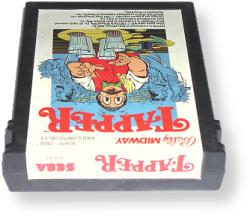 | | Standard Case | Sega Normal case games usually have a white label with colorful text and some
game artwork. The Normal case looks like an Activision case without any embossed
name on the back. Some Sega games come in Normal and Grip
styles. | 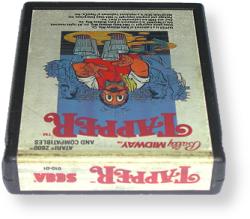 |
| Selchow & Righter | | Label Name | Description | Image | | Standard | Selchow & Ricther/QDI only made one game, Glib,
and it has a red label with yellow text and some game artwork. The case is similar
to that of an Activision cartridge. | 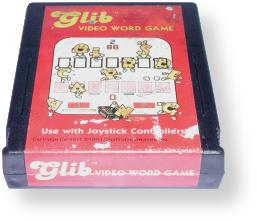 |
| Spectravision | | Label Name | Description | Image | | Standard | Spectravision labels are silver with colorful text. The cartridges have a main
label and an end label, with some recessed grooves near the end label to give
purchase when one is inserting or removing the cartridge. Outside of North America,
Spectravision was known as Spectravideo. | 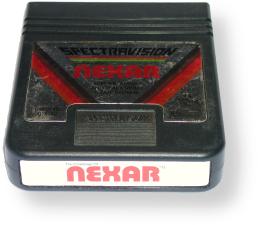 |
| Starpath | | Label Name | Description | Image | | Cassette | All of Starpath's games were produced on cassettes. They use a standard cassette
case with a colorful insert featuring game art and other information. The cassette
itself also has a label, usually a solid color with black text. | 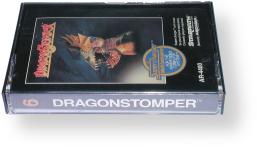 |
| Sunrise | | Label Name | Description | Image | | Standard | Sunrise only made one game for the 2600. Quest
for Quintana Roo has a silver wraparound label that covers two-thirds of the
cartridge front. There is no picture, just the game name and the Sunrise logo.
The end label simply says "Quest" | 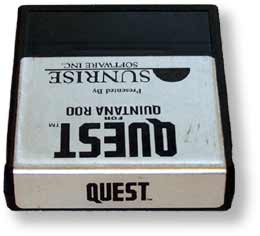 |
| Telegames | | Label Name | Description | Image | | Silver | Telegames labels are silver with black text, featuring a label that covers the
main area and wraps around the end. | 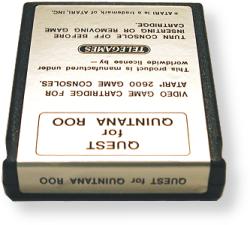 |
| Telesys | | Label Name | Description | Image | | Color Handle | Telesys' Color Handle case has a color picture of game art on a black background.
The end of the cartridge is beveled so like a handle making it easier to grab
the cartridge. This style has a single label that wraps around the end of the
cartridge. | 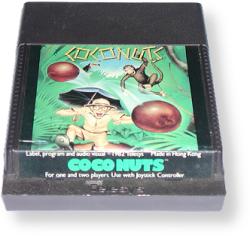 | | Color Standard | Telesys' Color Square style has the same color label as their Handle
style, but uses a more standard square casing with no handle on the end. This
style has separate main and end labels. | 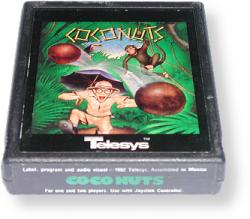 | | B&W Standard | The Telesys B&W Square label is the same as the Color
Square label except that it is in black and white with no end label, only a main
label. | 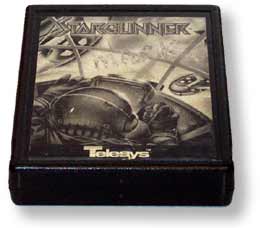 |
| Tigervision | | Label Name | Description | Image | | Standard | Tigervision cases come in different colors and feature colorful labels. The cases
are rectangular, with beveling on both sides near the end label. The main label
and end label are separate. | 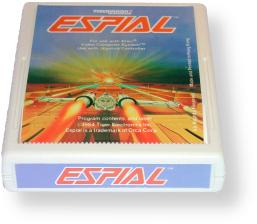 |
| TNT Games | | Label Name | Description | Image | | White | TNT only released one game, BMX
Airmaster, but with two different labels. One is a fairly plain white label with blue text and the other is a more colorful red label with a picture of someone riding a BMX bike. The red label is harder to find. The Atari version
of this game is very different, and looks like the standard Atari Red label. | 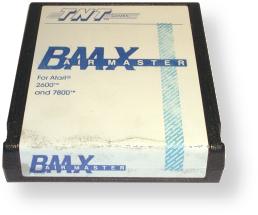 | | Red | TNT only released one game, BMX
Airmaster, but with two different labels. One is a fairly plain white label with blue text and the other is a more colorful red label with a picture of someone riding a BMX bike. The red label is harder to find. The Atari version
of this game is very different, and looks like the standard Atari Red label. | Picture Not Available |
| U.S. Games | | Label Name | Description | Image | | Beveled Case | This style is similar to the Standard
style, but the main label and end label are separate pieces. The end of the cartridge
near the end label is beveled, making a handle that can be gripped to insert or
remove the cartridge. Labels are white with some game art, with the game title
in white text against a blue banner. | 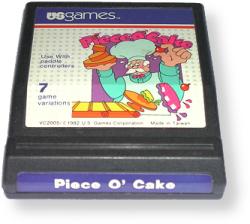 | | Standard Case | Similar to the beveled
style, except the label is a single wraparound piece. Labels are white with some
game art, and the game title in white text against a blue banner. | 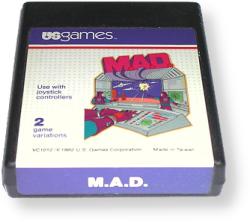 | | Black | These games were released with the US Games and Vidtec names, before the company
switched to US Games only. These labels are black with white text and some game
art. The label is a single wraparound style. | 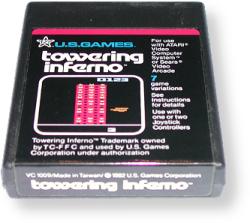 |
| Unknown | | Label Name | Description | Image | | Beagle Brothers | These cartridges carry the name "Beagle Brothers" on the label, although they were not produced by the similarly named Beagle Bros software developer who published home computer software in the 1980's. We have spoken to several ex-Beagle Bros employees who are unaware of any Atari 2600 carts produced by the company. We believe they are pirate carts originating in South America due to the nature of the circuit boards contained within. The "Beagle Brothers" name was likely used to capitalize on the popularlity of the brand at the time.
The games themselves are simply repackaged versions of existing titles from Activision, Atari, Parker Brothers, and other companies. Due to the simple nature of the labels, it is likely that reproductions of these cartridges are floating around. Beware of fakes in the collector market. | Picture Not Available | | Green | | Picture Not Available | | Taiwan Simple | These unlicensed games have a simple color label in a standard cartridge case, and the name of the game in white lettering on the end label. This type of label has shown up all over the world, and was used by several companies (Zellers for example). These games were either found loose, or in a generic box with no company name. | Picture Not Available | | Taiwan Cooper | We have grouped these games together because of the similar box and cartridge styles. All boxes have a drawing on the front with a "New" logo above the drawing. The back of the box has some simple instructions and a mock screenshot. These games have been found in the US and in Europe, and they were made in Taiwan (according to the back of the box). The font on these cartridges is Cooper Black, hence our description of these as "Taiwan Cooper". We don't know who actually made them, or if there were any official distribution channels. We have listed these games as NTSC for the time being, although the games found in Europe play fine on PAL systems. We're not sure if they were actually distributed in both formats, or only one format that happens to work on both TV formats. If you have any further information about who made these or how they were distributed, please contact us. | Picture Not Available | | V Case | These cartridges have a simple color label that is shorter than most, because the label area is smaller. The end label is simple white text on a black background. The top of the case has a series of ridges with a "V" shape cut out of them. They appear to be unlicensed games distributed in Europe. | Picture Not Available | | Video Game SP | | Picture Not Available | | Fantastic Game | | Picture Not Available | | Pet Boat | | Picture Not Available |
| VentureVision | | Label Name | Description | Image | | Standard | Venture Vision's single game has a light blue label with dark blue text. The
label wraps around the end and features game art on the main area. | 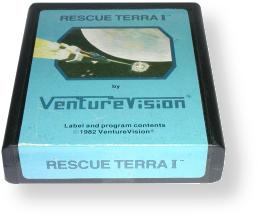 |
| Wizard Video | | Label Name | Description | Image | | Standard | The Wizard Video label is red with black text. The main and end label are separate,
and there is some artwork on the main label. Wizard boxes are very hard to find. | 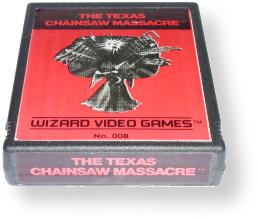 | | No Label | Halloween was released with a standard
Wizard Video label, and also without a label at all. We can only guess that Wizard
was trying to cut costs and shipped out a number of games with no label. "Halloween"
is often written in black marker across the main area of the cartridge (and sometimes
misspelled). | 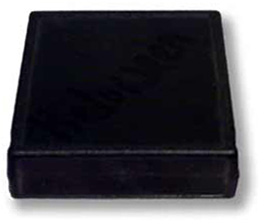 |
| Xonox | | Label Name | Description | Image | | Standard | The standard Xonox cartridge is a single-ender as opposed to the double-ender
that Xonox also marketed. There is a single label, and the end of the cartridge
is beveled down. It is also much wider at this end of the case than the opposite
end. Labels are typically blue with game artwork, and the title in red is against
a yellow banner. All the Standard case games were also released on Double-Enders. | 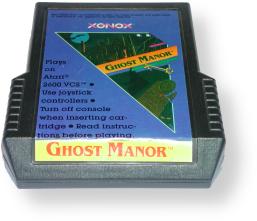 | | Double Ender | The Double-Ender is two games in one - each end of the cartridge has a different
game. These cartridges are about 2.5 inches longer than a standard cartridge,
and the case is wider in the middle. There is one long label that is typically
blue, with game art for both sides split diagonally down the middle. Titles are
printed in red text against a yellow banner. All the titles found on the Double-Enders
can also be found in standard single-ended
cases. | 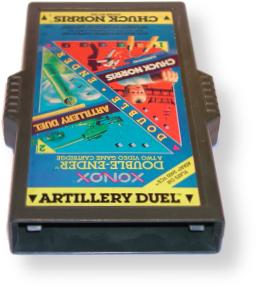 |
| Zellers | | Label Name | Description | Image | | Standard | Zellers games come in plain black cases with a separate main label and end label.
The end label is black with white text, and the main label features game artwork.
The Zellers name does not appear on the cartridge. Zellers boxes are red with
white lettering with a large picture of game artwork. The Zellers name appears
in plain text in the price box. | 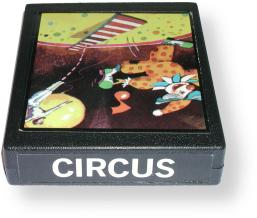 |
| Zimag | | Label Name | Description | Image | | Standard | Zimag labels are black wraparound style with game art and b&w text against
a rainbow banner. | 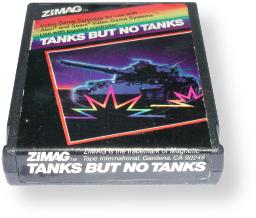 |
|

